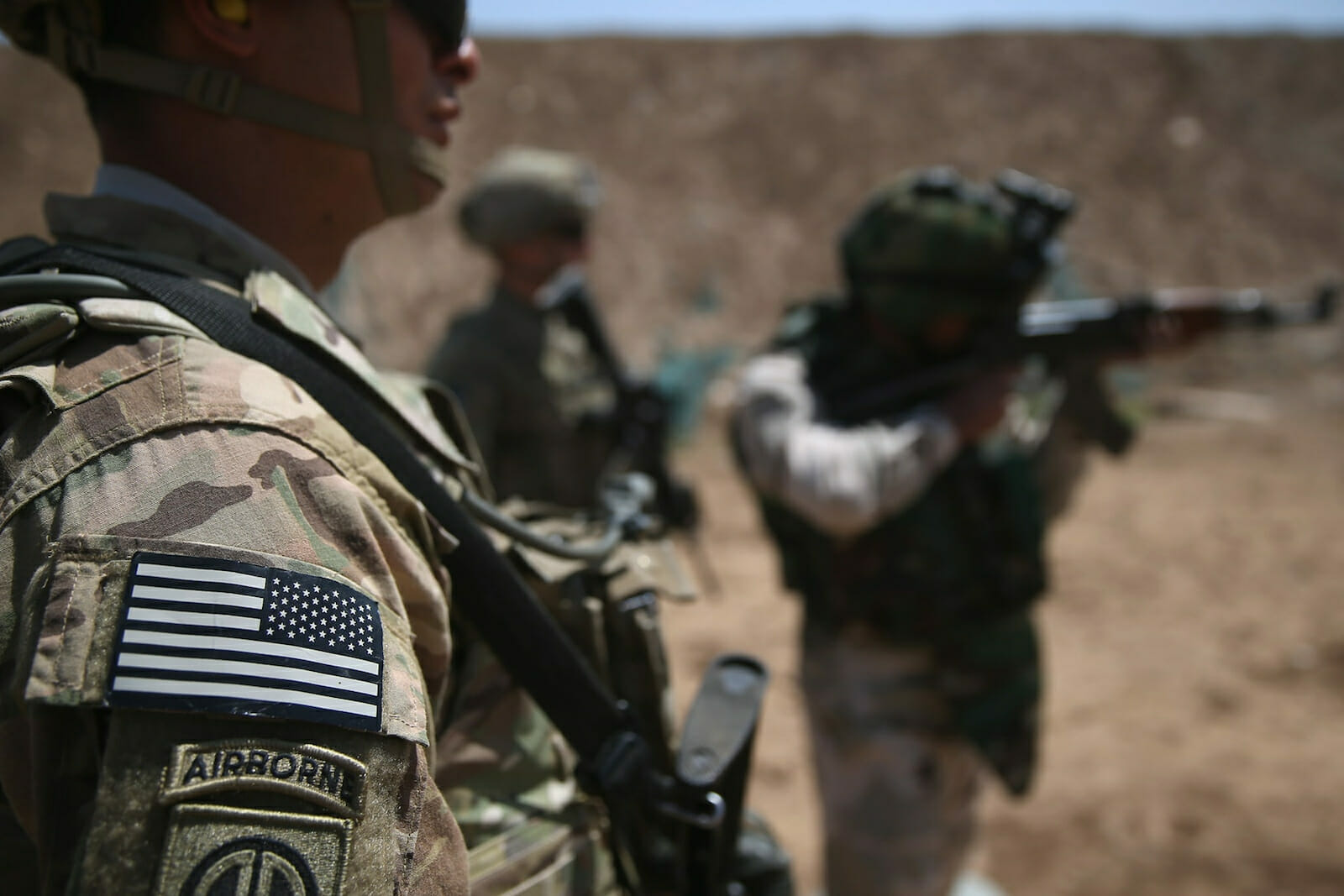
Iraq: A Theatre of Conflicts and Rivalries
The U.S. invasion of Iraq in 2003 changed the geopolitical situation of the region. The political vacuum in Iraq at different stages evolved to be a theatre for competition between the U.S. and Iran and added new challenges to the country with the rise of the Islamic State. The fact that Iran had managed to forge alliances and influence the politics in Iraq through opposition groups opposing Saddam Hussein favored Iran after the U.S. invasion. Some of the main opposition groups that the U.S. designated as official opposition political parties were eligible for U.S. assistance as per the Iraq Liberation Act of 1998. Many of these groups had very strong links to Iran.
For example, after the invasion, there were allegations that one of the main channels for the intelligence on Iraq possessing WMD’s was through the Iraqi National Congress led by Ahmed Chalabi. Ahmed Chalabi maintained close links with Tehran and was one of the strongest opponents of Saddam’s regime. The Kurdistan Democratic Party in Iraq also maintains close links with Tehran and envisions to expand its diplomatic bandwidth by engaging with other regional powers to economically develop Erbil. The Iranian Ambassador to Baghdad met Nechirvan Barzani in October 2019 and discussed on accelerating the bilateral engagement between Iran and Kurdistan Regional Government in Iraq. Iran also has links with multiple other opposition groups in Iraq and it has benefited Iran to have an impact on the domestic politics of Iraq.
Iran’s growing influence in Iraq
Ever since the U.S. withdrawal of forces that was completed in 2011 the reconstruction of the Iraqi political system showed signs of change that exhibited the influence of Iran overtly. The extent of influence began with Nouri al-Maliki as the Prime Minister and the Iranian influence was strongly represented in the parliament by the Sadrist followers. The return of Moktada al-Sadr in 2011 after his voluntary exile in Iran signaled the changes that were about to unfold in Iraqi politics. Although there were different contradictions between Maliki and Sadr they both realized the importance of each other for their survival in Iraqi politics. It was certain that the divisions within different coalitions that came ahead to form government in Iraq made it vulnerable to instability and foreign interventions.
The recently leaked intelligence reports by The Intercept and The New York Times clearly points out how Iran had executed its agendas in Iraq. The leaked reports suggested that post-U.S. withdrawal from Iraq, Iran managed to add former CIA informants to its payroll. Iran also managed to move some of its officers from the Intelligence Ministry as well as the Intelligence Organisation of the Revolutionary Guards to Iraq. The leaked reports further confirmed some of the CIA agents on the ground in Iraq turning their allegiance to Iran. As per Iraqi officials, the Iranian spies are mostly everywhere in southern Iraq. The leaked cables quoted an Iraqi military intelligence officer who offered to spy for Iran affirming his allegiance to Tehran. He said that he had received a message from Lt. Gen.Hatem al-Makusi the then commander of military intelligence in the Iraqi Ministry of Defence. The message to Iran from the commander was quoted as “Tell them (Iran) we are at your service. Whatever you need is at their disposal. We are Shia and have a common enemy.” The leaked cables and the political changes in Iraq to a large extent openly revealed the influence Iran had managed to garner in Iraq.
Iraq’s energy dependance on Iran also epitomizes the position Iraq has been pushed to where despite a large majority of Iraqi people disapprove of foreign interventions in Iraq the country has not been able to be completely independent of such interventions. Southern Iraq has been hugely relying on Iran for electricity and Iran also has an influence on key market domains in southern Iraq which many of the local businessmen are wary about. These trends clearly highlight the extent to which Iran had maneuvered its control in Iraq both economically and politically.
Protests in Iraq and its implications
The fragmented Iraqi security services are cracking down viciously since demonstrations first started in Baghdad on 1st October 2019, which lead to at least 400 protesters dead so far. Heavily involved in the crackdown are factions of the paramilitary umbrella organization Hashd al-Shaabi or Popular Mobilization Forces (PMF), whose most powerful factions are known to be strongly affiliated with Iran. The strategy of the crackdown includes the deployment of snipers shooting with live ammunition from rooftops and the partial shutdown of the Internet. Those measures are reminiscent of the tactics used by the Iranian government, when on 15th November 2019, the largest demonstrations in Iran since the Islamic Revolution broke out. The similarities of the actions taken are a testimony to the strong Iranian influence in the decision-making process in Iraq.
The decision to answer peaceful protests with violence backfired for the Iraqi Government. The number of protesters skyrocketed as the demonstrations rapidly expanded from the capital to mainly the southern, Shia dominated provinces. Angered by mass unemployment, corruption, and permanent foreign interference since the 2003 U.S.-led invasion, the character of the demonstrations seems to have become increasingly nationalistic and anti-sectarian in the eye of a common enemy. Iran’s strong reaction to the events unfolding on the Iraqi streets hints at their knowledge of the power nationalism possesses even when weighted against their overwhelming control of the political sphere in Iraq. It also shows the increased pressure and paranoia that set in for Tehran with sanctions pressing down on the country.
The momentum of the demonstration shifted once again when Grand Ayatollah Ali al-Sistani publicly decided to come out of his reserved attitude to emancipate himself from the Iranian hegemony. Sistani publicly condemned the lethal force against demonstrators and called for early elections during Friday prayers on 22nd November 2019. This came after he had already demanded an investigation by the government to determine the forces responsible for the killing of protesters on October 11. The country’s top cleric has had repeatedly signaled at his own agenda which differs from the revolutionary, theocratic Shiism that is promoted by Iran. He is known for his preference of the Iraqi democratic quota system that basically guarantees the continuation of power for the Shia sect. His involvement in the demonstrations gave further legitimation to the protesters and turned out to be a turning point in the events so far. A week after Sistani’s statements Prime Minister Adil Abdul-Mahdi announced his intention to resign. Iranian Major General Qassem Soleimani, the long-serving head of Iran’s al-Quds brigades, was swiftly invited to Baghdad to assist in the search for a new prime minister. Sistani stayed vocal in stating that a new prime minister has to be chosen without the influence of a foreign power, apparently nodding to Soleimani’s visit.
Saudi Arabia’s desire for Iraqi nationalism
Saudi Arabia renewed its engagement with Iraq in 2016 and had tried to accelerate its economic ties with Iraq thereafter. The Kingdom reopened its Baghdad embassy in 2016 after it was closed in 1991 in response to Iraq’s invasion of Kuwait. This signaled Riyadh’s rapprochement efforts with respect to Iraq. In April 2019 Saudi Arabia opened a new consulate in Baghdad. The Kingdom also announced $1 billion in loans for development projects in Iraq. These developments further suggest that the Kingdom is keen on accelerating its ties with Iraq although Riyadh has major limitations to penetrate the Iraqi political sphere and has relatively less influence upon the political leadership in Iraq especially at a point in time when a large majority of Iraqi people are worried about Iraq being a theatre for proxy conflicts.
For the leadership in Riyadh, the demonstrations in Iraq present an unprecedented opportunity for a shortcut to gain influence in Iraq. The overwhelming influence of Teheran on Iraqis political leadership has not deteriorated yet, as the recent attendance of Soleimani indicates. Then again, the resignation of Mahdi and the resilience of Iraqi protesters to remain on the streets are strong signals for Iraqi officials which could lead to cracks in their loyalty towards Iran. Riyadh certainly banks on the pragmatism of the Iraqi state apparatus in search of new allies and financial gains. This pragmatism has been showcased in their recent past. With the U.S. and Iran dominating the political reality since 2003, the ruling elite in Iraq was willing to adapt to polar foreign forces before. Saudi Arabia is hoping that nationalism beats out sectarianism, in collective Iraqi consciousness and as a tool for the political elite. Such an outcome could mean more room for the Arab-ethnic background to resurface in the south of Iraq. This would equal a loss of Iranian influence and thus Saudi gains in the greater struggle for power in the region. Besides, it would open up the Shia dominated areas, which are generally less rattled by ISIS than Sunni dominated areas, for Saudi investments.
Necessary for the continuance of nationalistic sentiments to penetrate deeper into Iraqi society is the emergence of the Iraqi Shia clerics sitting in the holy city of Najaf, as an independent and vocal Iraqi religious institution. Grand Ayatollah Sistani has demonstrated that with his voice over the public opinion he has the tools to influence Baghdad’s political elite more than any other domestic player. One could certainly see the influence that Sistani has had already, going in the seventh week of mass protests. His role in stabilizing a more nationalistic Iraq could be even bigger. The news of the Iranian consulate in Najaf being set on fire by protesters for the second time in a week, even after Mahdi’s resignation, certainly could not be more symbolically promising for Saudi Arabia. If all comes together Iraq could open up a lot quicker towards Riyadh than the Kingdom had envisioned when they reintroduced themselves into Iraqi politics in 2017.
With Saudi Arabia and UAE accentuating its pressure on Iran, Iran needs to withhold its influence in Iraq. Iran is keen on establishing a strong and reliable partnership with Iraq as Tehran views Iraq as a strong economic and cultural partner. Such a partnership would be strategically vital for Iran for many reasons and becomes even more crucial amid the U.S. sanctions clamping down on the Iranian economy. It would help Iran to counter any possible proxy Sunni militancy along the borders, prevent an independent Kurdistan which Iran has been opposing for a long time and extend its influence in the region. While Saudi Arabia is eagerly waiting to seize any opportunity in Baghdad Iran has high stakes in the conflict-ridden country at a point in time when the regional developments pose burdensome challenges for Iran.


